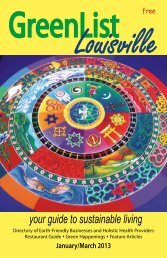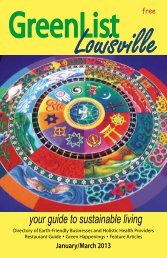July/August 2010 - GreenList Louisville
July/August 2010 - GreenList Louisville
July/August 2010 - GreenList Louisville
You also want an ePaper? Increase the reach of your titles
YUMPU automatically turns print PDFs into web optimized ePapers that Google loves.
Project Warm -- Reducing <strong>Louisville</strong>’s Energy<br />
Usage for Nearly 30 Years<br />
By Alyson Goldberg<br />
To date, Project Warm has saved <strong>Louisville</strong><br />
households over $25 Million in energy costs<br />
and they are working hard to do even more.<br />
Project Warm is a non-profit organization<br />
that was founded in 1982 to provide free<br />
weatherization services for low-income<br />
households that could no longer afford<br />
their high utility bills. The escalating energy<br />
prices of the 1970s, approximately a 600%<br />
increase in the cost of natural gas, created<br />
a crisis for many fixed-income households<br />
as well as the families of many workers<br />
who were laid off from industries that<br />
were shutting down or down-sizing their<br />
workforces. The cost of energy continues<br />
to weigh heavily on our community today.<br />
Action’s LIHEAP Crisis Program, which<br />
provides utility assistance to lowincome<br />
residents who have received a<br />
disconnection notice from their utility<br />
service provider or a past due bill with a<br />
disconnection notice, or who have received<br />
an eviction notice from their landlord if<br />
utilities are included in their rent, or who<br />
are currently without utility services.<br />
“In the past many <strong>Louisville</strong> homes were<br />
built without concern for energy efficiency,”<br />
said Project Warm Executive Director<br />
Frank Schwartz. “Windows are single<br />
paned, there are gaps around doors and<br />
windows, and many other energy wasting<br />
problems. These basic construction issues<br />
create an unnecessary cost burden on all<br />
of us, especially for those on low-income.”<br />
According to the U.S. Department of<br />
Energy, drafts can waste 5% to 30% of your<br />
energy use.<br />
In 2005, AARP completed the study,<br />
“Affects of Energy Costs on US Adults,”<br />
which included the following two results:<br />
•Sixteen percent of respondents have<br />
delayed payment of bills as a result of<br />
increased energy costs, with significantly<br />
more adults 18-49 delaying payments<br />
(21%) compared to adults 50+ (9%).<br />
•Some Americans are also limiting or doing<br />
without food (15%), telecommunications<br />
(15%), medical services (11%), or<br />
prescription drugs (11%) because of higher<br />
energy costs.<br />
In response to statistics such as these, the<br />
Federal Government has set up programs<br />
such as the <strong>Louisville</strong> Metro Community<br />
“If all we do is try to pay off a bill once<br />
utilities are ready to shut off service, than<br />
we are actually providing a disservice to<br />
our community,” said Schwartz. “However,<br />
if instead we focus on changing the amount<br />
of energy used, thereby reducing the bill<br />
to an affordable amount, we empower<br />
people to care for themselves, reduce our<br />
governments expenditures, and work to<br />
improve our environment. Our objectives<br />
are a win for everyone.”<br />
With a modest budget, and a staff of 2<br />
fulltime and 2 part time people, Project<br />
Warm trains and organizes hundreds of<br />
volunteers to weatherize the homes of<br />
poor and elderly in our community. The<br />
2,000 homes we serve each year save an<br />
average of $382 in energy costs.<br />
•That means more families stay in their<br />
homes.<br />
11








